
Antibodies
Scope & Guideline
Exploring the Frontiers of Immune Response Mechanisms
Introduction
Aims and Scopes
- Therapeutic Antibodies and Immunotherapy:
Research on the development, characterization, and application of therapeutic antibodies, including monoclonal antibodies, bispecific antibodies, and antibody-drug conjugates for cancer and autoimmune diseases. - Antibody Engineering and Design:
Studies focused on the engineering of antibodies, including humanization, affinity maturation, and the creation of novel formats such as nanobodies and intrabodies. - Vaccine Development and Immune Responses:
Exploration of immune responses elicited by vaccines, particularly in the context of emerging infectious diseases like COVID-19, and the role of antibodies in vaccine efficacy. - Diagnostics and Serology:
Research on antibody detection methodologies and their applications in diagnostics, including serological assays for infectious diseases and autoimmune conditions. - Basic Immunology and Antibody Function:
Investigations into the fundamental mechanisms of antibody action, including epitope mapping, antibody specificity, and the role of antibodies in immune responses.
Trending and Emerging
- COVID-19 and SARS-CoV-2 Antibody Research:
A significant increase in studies related to SARS-CoV-2 antibodies, focusing on immune responses, vaccine efficacy, and therapeutic antibodies, illustrating the pandemic's impact on research priorities. - Bispecific and Multispecific Antibodies:
Emerging interest in bispecific antibodies and other multispecific formats as innovative therapeutic strategies, particularly in oncology, highlighting their potential to engage multiple targets simultaneously. - Personalized Medicine and Targeted Therapies:
A rising trend towards personalized antibody therapies tailored to individual patient profiles, particularly in cancer treatment, reflecting advancements in precision medicine. - Antibody-Drug Conjugates (ADCs):
Increased focus on the development and optimization of ADCs, as these combine the targeting capabilities of antibodies with the cytotoxic effects of drugs, offering promising therapeutic options. - Immuno-oncology and Immune Checkpoint Inhibitors:
Growing research into the mechanisms of immune checkpoint inhibitors and their interactions with antibodies, indicating a trend towards enhancing the efficacy of cancer immunotherapies.
Declining or Waning
- Traditional Monoclonal Antibody Production:
The focus on conventional methods for monoclonal antibody production has decreased, with a growing emphasis on more advanced techniques such as recombinant DNA technology and phage display. - Passive Immunotherapy for Infectious Diseases:
Interest in passive immunotherapy approaches, particularly for diseases like HIV and influenza, appears to be waning as more emphasis is placed on active immunization strategies and vaccine development. - Autoantibodies in Health and Disease:
The exploration of autoantibodies as biomarkers for health conditions has seen a reduction, possibly due to a shift towards more targeted therapeutic approaches and the complexities of autoimmune diseases.
Similar Journals

EPIDEMIOLOGIE MIKROBIOLOGIE IMUNOLOGIE
Fostering Insights into Infectious DiseasesEPIDEMIOLOGIE MIKROBIOLOGIE IMUNOLOGIE is a prominent scholarly journal published by CESKA LEKARSKA SPOLECNOST J EV PURKYNE in the Czech Republic. With an ISSN of 1210-7913, this journal has been at the forefront of research since its inception in 1994, showcasing a rich repository of studies bridging the domains of epidemiology, microbiology, immunology, and infectious diseases, and reflecting advancements over three decades. Although it currently falls within the Q4 category in multiple fields including Epidemiology and Microbiology, the journal serves an essential role in disseminating knowledge and fostering discussions around public health challenges. The contributions made through its pages are vital for researchers, healthcare professionals, and students aiming to enhance their understanding of complex biomedical issues. While it does not offer open access, the journal remains a critical resource in its niches, inviting readers to engage with the latest findings and methodologies reshaping the landscape of health science.
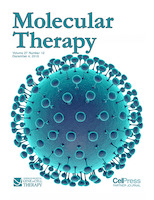
MOLECULAR THERAPY
Pioneering innovative therapies through molecular insights.MOLECULAR THERAPY, published by CELL PRESS, is a distinguished journal in the field of molecular biology and therapy, renowned for its significant contributions to drug discovery, genetics, and pharmacology since its inception in 2000. This prestigious journal, which holds a commendable position in the Q1 category across multiple disciplines including Drug Discovery, Molecular Medicine, and Molecular Biology, facilitates cutting-edge research and innovative therapies that aim to improve patient outcomes. With an impressive Scopus ranking that places it among the top journals in its field—such as rank #6 in Drug Discovery and #8 in Pharmacology—MOLECULAR THERAPY is crucial for researchers, professionals, and students seeking to advance their understanding and application of molecular techniques. The journal welcomes high-quality submissions that explore the therapeutic potential of molecular mechanisms, fostering a collaborative spirit within the scientific community to push the boundaries of modern medicine.

Immunity Inflammation and Disease
Connecting researchers to foster collaboration in immune science.Immunity, Inflammation and Disease is a premier open-access journal published by WILEY, dedicated to advancing the field of immunology and allergy. Launched in 2013, this journal has established itself as a significant platform for researchers and professionals to disseminate high-quality research findings and innovative insights that address critical issues in immune responses and inflammatory diseases. With an impact factor that reflects its growing influence and a current ranking in Q3 for Immunology and Q2 for Immunology and Allergy, this journal serves a diverse audience keen on exploring cutting-edge developments. Researchers are encouraged to submit their work to share their findings with a global reach, foster collaboration, and enhance the understanding of immune mechanisms and therapeutic strategies. Accessible since its inception, Immunity, Inflammation and Disease is committed to open science, ensuring that vital research is freely available for the advancement of knowledge within the academic community and beyond.

Targeted Oncology
Transforming oncology with cutting-edge therapies.Targeted Oncology is a premier, peer-reviewed journal published by SPRINGER, focusing on the latest advancements in the field of oncology, specifically targeting the development and application of targeted therapies. Since its inception in 2006, this journal has become an essential resource for researchers, healthcare professionals, and students, providing critical insights into innovative cancer treatments and the pharmacological landscape. Recognized for its impactful contributions, Targeted Oncology holds a distinguished Q1 ranking in both Oncology and Pharmacology categories as of 2023, underscoring its influence and relevance in the scientific community. With an impressive Scopus ranking reflecting its strong citation impact, the journal not only disseminates high-quality research but also facilitates knowledge exchange among oncologists and researchers working towards improving patient outcomes. Although not an Open Access journal, Targeted Oncology is committed to advancing cancer research and therapeutic strategies, making it an invaluable addition to the libraries of any institution dedicated to health and wellness.

Immunotherapy
Connecting Researchers to the Frontiers of ImmunotherapyImmunotherapy, published by Future Medicine Ltd, is a leading journal focused on the evolving field of immunotherapy within the realms of immunology, oncology, and allergy. With an ISSN of 1750-743X and an E-ISSN of 1750-7448, this academic journal has been at the forefront of groundbreaking research since 2009, and continues to illuminating insights in a landscape critical for the development of innovative therapeutic strategies through 2024. Positioned within Q2 and Q3 quartiles in various relevant categories, the journal ranks commendably in Scopus metrics, exhibiting robust engagement and relevance in Oncology and Immunology. It serves as an essential resource for researchers, clinicians, and students eager to stay abreast of advancements in immunotherapy, while also providing an open platform for sharing impactful studies. By disseminating high-quality research, Immunotherapy fosters a global dialogue among professionals and contributes significantly to the scientific community's collective knowledge on the increasing role of immune-based therapies in disease management.
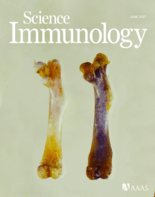
Science Immunology
Unlocking the Secrets of the Immune SystemScience Immunology, published by the American Association for the Advancement of Science, is a leading journal in the field of immunology, recognized for its significant impact and rigor in advancing our understanding of immune responses and complex diseases. With an impressive impact factor that places it in the Q1 category of both immunology and allergy, as well as miscellaneous medicine, this journal is ranked #7 and #8 in their respective Scopus categories, reflecting its high-quality research output. Since its inception in 2016, Science Immunology has been at the forefront of interdisciplinary immunological research, fostering crucial insights that link immunology with pressing health challenges. The journal is committed to providing open access to its content, ensuring that groundbreaking findings are accessible to a global audience of researchers, professionals, and students. Its anthology not only addresses fundamental immunological mechanisms but also enhances the dialogue on translational applications and therapeutic interventions, solidifying its position as an essential resource within the scientific community.
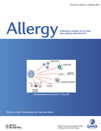
ALLERGY
Leading the Charge in Allergy Research and Education.ALLERGY is a leading international journal published by WILEY, dedicated to advancing the understanding of allergic diseases and immunology. With an ISSN of 0105-4538 and an E-ISSN of 1398-9995, this esteemed journal has been at the forefront of the field since its inception in 1948 and continues to publish high-quality research up until 2024. Positioned in the Q1 category for both Immunology and Allergy, ALLERGY ranks impressively within the top percentiles of its categories, underscoring its significant impact, as reflected in its Scopus rankings (#11 out of 233 in Immunology and Allergy, and #14 out of 236 in Immunology and Microbiology). Researchers and practitioners accessing this journal can expect a rigorous selection of peer-reviewed articles that address current challenges, innovative therapies, and advancements in the immunological sciences. Although it is not an open-access journal, ALLERGY remains vital for academics, healthcare professionals, and students alike, fostering a deeper understanding of the mechanisms and treatments associated with allergies.

DRUGS
Unveiling Breakthroughs in Drug DevelopmentDRUGS is a prestigious, peer-reviewed journal published by ADIS INT LTD, specializing in the field of pharmacology across diverse medical applications. With an impressive impact factor and ranking as Q1 in the Pharmacology (Medical) category as per the 2023 metrics, this journal consistently exhibits a strong influence in the medical research community, holding a notable rank of #3 out of 272 in its domain on Scopus, placing it within the 99th percentile. Established in 1971 and converging its insightful contributions until 2024, DRUGS encompasses a broad scope, focusing on the latest advancements in drug research, development, and clinical applications, aiming to bridge the gap between laboratory discoveries and therapeutic practices. Though not an Open Access journal, it remains a key resource for researchers, professionals, and students keen on exploring cutting-edge findings and developments in pharmacology. Its location in the United Kingdom further emphasizes its role as a global leader in pharmaceutical sciences.
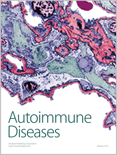
Autoimmune Diseases
Exploring innovative treatments for autoimmune disorders.Autoimmune Diseases is a leading open-access journal published by Hindawi Ltd, dedicated to advancing the understanding and treatment of autoimmune disorders. Since its inception in 2010, this journal has provided a vital platform for researchers, clinicians, and students to share innovative findings and insights from the field of immunology. With an impressive Scopus ranking that highlights its relevance, particularly in the areas of Immunology and Microbiology and Immunology and Allergy, Autoimmune Diseases occupies a key position in the scientific discourse, ranking in the top quartiles across various categories. Researchers publishing in this journal benefit from a wide audience and high visibility, reflecting the increasing importance of understanding autoimmune diseases in today’s health landscape. Accessible to all, the journal promotes collaborative research and discussion, making it an essential resource for anyone dedicated to the study and management of autoimmune conditions.
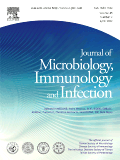
JOURNAL OF MICROBIOLOGY IMMUNOLOGY AND INFECTION
Connecting researchers to advance immunological science.Welcome to the Journal of Microbiology Immunology and Infection, a premier academic publication established in 1998 and now proudly owned by Elsevier Taiwan. As an Open Access journal since 2016, it provides unrestricted access to groundbreaking research in the fields of immunology, microbiology, and infectious diseases, making it an essential resource for researchers, practitioners, and students alike. The journal holds impressive rankings, including Q1 status in categories such as Infectious Diseases and Microbiology (medical), and a notable 92nd percentile in its Scopus ranking for Medicine - Infectious Diseases. With a dedicated focus on advancing knowledge and fostering collaboration within the scientific community, the Journal of Microbiology Immunology and Infection is committed to publishing high-impact research that significantly influences practice and policy in healthcare and life sciences. The journal is also recognized for its contribution to the ongoing dialogue surrounding contemporary issues in immunology and infection, positioning it as a vital platform for scholarly exchange and innovation.